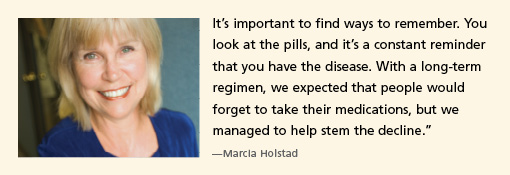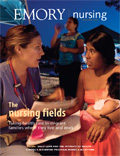Spreading good KHARMA
Motivating HIV-positive women to take their medication
|
|
They are the women society tended to overlook—poor, minority, and HIV-positive. They were raising children, trying to maintain relationships, and working long hours to pay bills, all the while living with HIV.
Hearing their daily struggles was commonplace to Marcia Holstad, a faculty member of the Department of Family and Community Nursing. She'd heard their stories as a nurse practitioner working exclusively for almost two decades with HIV-positive and AIDS patients.
"These women were not viewed as success stories," she says. "There were histories of abuse and drug use. Sometimes, HIV was the least of their problems."
Still, Holstad thought they could be success stories, but they wouldn't have the chance if they didn't take their medication to hold off AIDS. If they felt good about themselves, they would have a stronger incentive to take their medication regularly. They just needed a little motivation to get there.
So Holstad devised a program called KHARMA, keeping healthy and active with risk reduction and medication adherence. Its main component is motivational interviewing in a group format, led by nurse facilitators. No preaching to the choir, as the saying goes, by the nurses, only helping the women realize what is important to them.

On average, the women in the study had been taking medication for more than six years and had been HIV-positive for almost 10 years.
"We asked them to look at and clarify their values," Holstad says. "What's important to them? What is their behavior and how does it relate to that important value? For example, if they want to be here long term for the sake of their children, then how can they accomplish that? Most would say they need to take their meds."
The women had to be on medication to take part in the groups. In addition to issues about taking medication, the groups discussed reducing the risk of infecting others with HIV, using female and male condoms, and disclosing HIV status and the potential resulting stigma.
"They talked about how to have that conversation," she says. "There are women who tell everyone and those who tell no one. If you haven't told anyone you have the disease, then taking meds can be difficult. They need to be able to have that conversation because anyone who has HIV needs a support system."
To determine whether the women were taking their medication, Holstad relied on their self-questionnaires, as well as laboratory results (viral loads and T-cell counts), and records from tiny microchips embedded in prescription bottle caps. The cap recorded every time the bottle was opened.
She continued tracking the women for nine months following the end of the group sessions. Preliminary data show that on average, the women in the study took their medication 65% of the time, compared with 60% of those in a control group. Forgetfulness was an often-cited reason for missing doses.
"It's important to find ways to remember," she says. "You look at the pills, and it's a constant reminder that you have the disease. With a long-term regimen, we expected that people would forget to take their medications, but we managed to help stem the decline."
Holstad also found that the women’s self-confidence increased and remained higher even after the group sessions ended.
"Our philosophy is that ideally the patient is an expert on herself," she says. "The nurse counselor simply works with each individual to find the best strategy for her."
Even the control group showed some improvement in self-confidence and taking medication. That group listened to lectures on nutrition, exercise, stress reduction, and other health issues. Ultimately, Holstad says she would like to combine the best of both programs into one comprehensive series.



